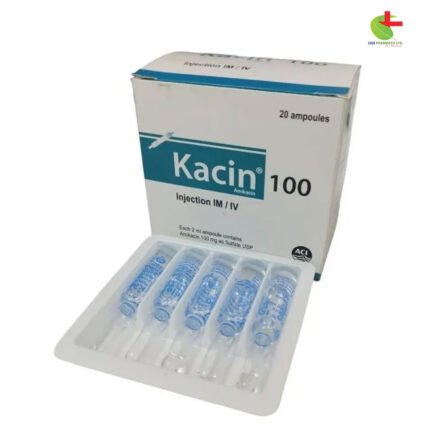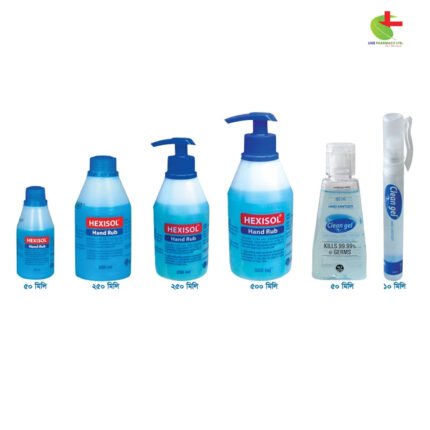Recogen 5000
2,557.00৳ Pre-Filled Syringe
- Recogen is a recombinant human erythropoietin (EPO) used to treat anemia caused by chronic kidney disease (CKD), HIV, chemotherapy, and surgery.
- It also helps prevent anemia in premature infants and reduces the need for RBC transfusions.
- It is administered through subcutaneous or intravenous injection, with dosage adjusted based on patient condition.
- Common side effects include hypertension, arthralgia, and injection site reactions. Use with caution in pregnancy and lactation.
 Brand
Brand
|
ACI Limited |
|---|---|
 Generics
Generics
|
Erythropoietin Alfa |
 Type
Type
|
IV/SC Injection |
Indications
Recogen is an erythropoiesis-stimulating agent (ESA) used for the treatment of anemia in various conditions, including:
- Chronic Kidney Disease (CKD): For patients on dialysis and those not on dialysis.
- Zidovudine-induced Anemia: In HIV-infected patients.
- Chemotherapy-induced Anemia: For patients undergoing myelosuppressive chemotherapy, with at least two months of planned chemotherapy remaining.
- Surgical Anemia: To reduce the need for allogeneic RBC transfusions in patients undergoing elective, non-cardiac, non-vascular surgery.
- Prevention of Anemia in Premature Infants: For babies with a birth weight of 750-1500 grams and a gestational age of less than 34 weeks.
Always consult a registered healthcare professional before using this medication.
Description
Recogen is a recombinant form of human erythropoietin (EPO). It is produced in Chinese hamster ovary cells and has a 165-amino acid sequence identical to human urinary EPO. It is functionally indistinguishable from native EPO and has a molecular weight of approximately 30,400 daltons.
Dosage
Iron and Nutritional Evaluation: Prior to starting Recogen therapy, it is essential to assess the patient’s iron levels and nutritional factors to ensure iron repletion. Address or exclude other causes of anemia (e.g., vitamin deficiencies, chronic inflammation, bleeding) before beginning treatment.
- For CKD Patients (Dialysis & Non-Dialysis): Regularly monitor hemoglobin levels during treatment. Adjust the dosage as required, considering hemoglobin changes and ESA responsiveness. Do not increase the dose more frequently than once every 4 weeks.
- Dialysis: Start treatment when hemoglobin is below 10 g/dL. Reduce or halt treatment if levels rise above 11 g/dL. A starting dose of 50-100 units/kg is recommended for adults, given three times a week.
- Non-Dialysis: Initiate treatment when hemoglobin falls below 10 g/dL, especially if transfusion is anticipated. The starting dose is 50-100 units/kg, administered three times weekly.
- For HIV-Infected Patients on Zidovudine: Begin with a dose of 100 units/kg three times per week.
- For Cancer Patients on Chemotherapy: Start only if hemoglobin is below 10 g/dL, and there is at least two months of planned chemotherapy remaining. Use the lowest dose needed to avoid RBC transfusions.
- Adults: 150 units/kg subcutaneously three times per week until chemotherapy ends.
- Pediatric Patients (5-18 years): 600 units/kg intravenously weekly until chemotherapy ends.
- For Anemia of Prematurity: Administer subcutaneously at a dose of 250 IU/kg per week, starting on day 3 of life if possible. The treatment duration is 6 weeks.
Always use Recogen under the supervision of a registered healthcare professional.
Administration
- Do not shake the vial and avoid using frozen Recogen. Protect the syringe from light.
- Visually inspect the solution for any particles or discoloration before administration.
- Discard any unused Recogen.
Use Recogen only under medical guidance.
Drug Interactions
There are no significant drug interactions. However, Recogen‘s effects may be enhanced when used with iron supplements like ferrous sulfate, especially when a deficiency is present.
Contraindications
- Uncontrolled hypertension
- Severe allergic reactions to Recogen
- Patients with Pure Red Cell Aplasia (PRCA) after using any erythropoietin should not receive Recogen or other erythropoietins.
Side Effects
Common adverse effects include:
- For CKD patients: Hypertension, muscle spasms, fever, dizziness, and upper respiratory infections.
- For HIV patients: Fever, cough, rash, and injection site irritation.
- For cancer patients: Nausea, vomiting, myalgia, arthralgia, and thrombosis.
- For surgery patients: Nausea, vomiting, headache, and deep vein thrombosis.
- For premature infants: Decreased serum ferritin levels.
Pregnancy & Lactation
There is limited data on Recogen use during pregnancy. In cases of chronic renal failure, it should be used only if the benefits outweigh the risks. It is not recommended for pregnant women involved in an autologous blood predonation program.
The excretion of Recogen in breast milk is unknown. Use caution when administering to breastfeeding women. Decisions regarding breastfeeding versus continuing therapy should be based on the benefits for both mother and child.
Overdose
Recogen has a wide therapeutic margin, but overdose may lead to elevated hemoglobin levels. Management includes dose reduction, discontinuation, or phlebotomy if necessary. Overdose may also cause severe hypertension.
Therapeutic Class
Medications for Hemolytic, Hypoplastic, and Renal Anemia.
Storage Conditions
Store at 2ºC to 8ºC. Do not freeze or shake. Keep in the original package to protect from light.
Always store Recogen as instructed and consult a healthcare provider for guidance.













Reviews
There are no reviews yet.